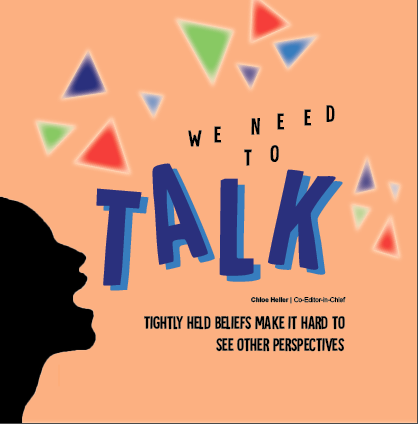We need to talk: Tightly held beliefs make it hard to see other perspectives

November 11, 2019
Coffee stunts your growth. There, I said it. It stunts your growth. The drink that 73 percent of American teens consume constantly is being proven to stunt your growth. Do you believe me?
According to a website called Changing Minds, we begin to believe information after just three times of hearing it. Not only are we so immediately persuaded, but we are convinced of things that might not even be true. How? This happens because we don’t take the time to check our sources, read background information or even just use common sense. Read that first paragraph again. Now, keep in mind that proven by many, including John Hopkins Medicine, coffee does not stunt your growth in any way.
Another thing you may not have noticed is that “73 percent of American teens” drink coffee is a bit of a bizarre, seemingly large statistic. That’s because it is, frankly, a lie. Roughly 40 percent of teens drink coffee, but this is besides the point. What you should be taking away right now is that not only did you perhaps find yourself nodding along to my pathetically repetitive claim, but you also jumped past a fake conclusion and “fact” without thinking twice.
When we start to believe something through repetition — whether it’s exposure through television advertisements, campaign posters, radio jingles or textbook definitions — we have fallen into the “illusory truth effect.” Although everyone finds commonality in this flaw, some become addicted to holding on to every small thing they hear and passing it on as fact.
In a study done at the Massachusetts Institute of Technology, researchers found that out of 126,000 news Tweets over the past 11 years, the “fake” news was 70 percent more likely to spread than the valid news. In an article titled, “The Problem with Believing what We’re Told,” by Gary Marcus and Annie Duke of The Wallstreet Journal, they accredited this behavior to “our need for approval, affection and positive feedback” — not just on social media, but far beyond into our daily lives.
The largest issue with our quick assumptions and acquired beliefs is that not only is the “fact” now in our system, but it will quickly grow.
Our world is full of unique people, which is a beautiful realization. However, this means that every person has their own specific set of beliefs, ideals and core.
“It’s real easy to get into the habit of [thinking], ‘Well that side is always saying this,’ or ‘That side is always [doing] this,’” Lincoln Southeast High School English teacher, Tommy Bender, said.
From these stereotypes, we develop walls between our own personal beliefs and the views of others. As a result, we surround ourselves with people with similar thoughts as us which only strengthens our views due to group polarization. This process is what forms internal — and occasionally external — anger towards opposing viewpoints, and this eventually leads to everything from nasty Twitter fights to full-blown wars.
Up until this point, it’s likely that everything I have been saying is common knowledge. However, it’s what comes next that we as a society need to solve. This problem is something that we should have learned to deal with as toddlers, but for some reason can’t translate into real-life, high-demand situations. We refuse to listen.
“It’s concerning to me, because we don’t often really sit and listen to each other. We just don’t,” Bender said. “It creates this idea that ‘they’ believe something different, and ‘we’ don’t believe that, so therefore we just don’t talk to them.”
Once we have our minds made up on a certain topic, we tie our identity to those ideologies in order to fit in socially and find refuge as a member of a group. It is in our nature to desire to be apart of something, and once we find that comfort we are extremely unlikely to let it go. According to Slate Magazine, this is why in most cases voters will never change their political affiliation from the political party, or “side,” they registered with at age 18.
“I think people get too caught up in the fact that they think their opinion is the only ‘right’ opinion,” Southeast senior Lane Howell said.
According to Bender, the solution to the problem is effective communication. “I think there’s got to be a better way to sit down and talk to people, and that’s more important than anything,” Bender said.
In an article written by the educational, nonprofit platform, TED (Technology, Entertainment and Design), a constructive conversation — rather than destructive argument — about controversial topics can be broken down into a few parts.
First, don’t go into the conversation thinking you are going to educate anyone. You need to walk in on level ground and have an open mind. Going along with this, if you know someone’s viewpoints going into the discussion and don’t necessarily agree with them, try to wipe away any pre-judgements you may hold and start with a blank slate. Pretend it’s your first time hearing about this way of thinking.
Next, don’t just tolerate the other person’s opinion, respect it. As discussed earlier, people hold their views very close to heart and often get overwhelmed when people try to fight against them, so simply being kind can go a long way.
Finally, if the conversation gets frustrating or awkward, just get through it. Keep in mind there’s no reason to talk about it again, and that once you get through this you can at least say you tried. However, if you follow each of these guidelines, chances are your discussion will leave you more at ease and open-minded towards a group or person you never knew you could get along with.
Not only is it dangerously easy for us to believe things we see on the internet and beyond, it’s often things that don’t even deserve our belief. For whatever reason, we get attached to these outrageous ideals and hold on so tight that we lose sight of what really matters. Valuing the idea that people believe what they believe and purposefully starting conflicts will only strengthen our views and separate us from others instead of leading us to unique relationships and understandings. To truly unite, we need to sit down and talk.









